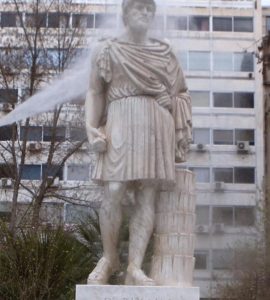Activity 3 / Actividad 3
"We are in 430 BC. Crowd in the city. Diseases break out. People and animals get sick. They die quickly, within a few days. The healthy are afraid to approach the sick. "Daily mourning. Despair. Two of our slaves got sick yesterday. At first they felt hot flashes and severe headaches. Then my throat was swollen. Then severe chest pain and a sharp cough. My mother would not let me approach." "" " "Maybe my turn came… I'm not afraid… Besides, I was born on the day of the dead…": Myrtis is living an epidemic in her time! Think about it with the help of the following questions and write a page in her diary:
What would be her thoughts?
What would you like to ask her?
Would he have the same feelings as you?
What differences would it have from a modern teenager experiencing a pandemic?
"Estamos en el 430 AC. Multitud en la ciudad. Las enfermedades estallan. Las personas y los animales se enferman. Mueren rápidamente, en pocos días. Los sanos tienen miedo de acercarse a los enfermos". "Luto diario. Desesperación. Dos de nuestros esclavos se enfermaron ayer. Al principio sintieron sofocos y fuertes dolores de cabeza. Luego mi garganta se hinchó. Luego dolor severo en el pecho y una tos aguda. Mi madre no me dejaba acercarme." "" " "Quizás llegó mi turno ... no tengo miedo ... Además, nací el día de los muertos ...": ¡Myrtis está viviendo una epidemia en su momento! Piense en ello con la ayuda de las siguientes preguntas y escriba una página en su diario:
¿Cuáles serían sus pensamientos?
¿Qué le gustaría preguntarle?
¿Tendría los mismos sentimientos que tú?
¿Qué diferencias tendría con un adolescente moderno que experimenta una pandemia?
Activity 2 / Actividad 2
Let's get to know the season and the city of Myrtida! How was the time that Myrtida lived? How was Athens, her city? In which streets did she walk, which people did she hear talking, from which places would she be excluded? What did he believe, what was he afraid of, what could a little girl who was growing up in the war years expect? As journalists you can record a fantastic interview with the girl in the form of a dialogue. You can get information here. The collaborative document should be entitled: Interview with a teenage girl from 430 BC
¡Conozcamos la temporada y la ciudad de Myrtida! ¿Cómo fue la época en que vivió Myrtida? ¿Cómo estuvo Atenas, su ciudad? ¿En qué calles caminaba, a qué personas oía hablar, de qué lugares sería excluida? ¿Qué pensaba, de qué temía, qué podía esperar una niña que estaba creciendo en los años de la guerra? Como periodistas, pueden grabar una entrevista fantástica con la niña en forma de diálogo. Puede obtener información aquí. El documento colaborativo debería titularse: Entrevista a una adolescente del 430 a.C.
Activity 1/Actividad 1
Activity 1: Your mission is to study the history of Myrtida. Create a collaborative presentation entitled: "How can a tooth interpret history?" to share with your classmates the information you find interesting.
Actividad 1: Tu misión es estudiar la historia de Myrtida. Cree una presentación colaborativa titulada: "¿Cómo puede un diente interpretar la historia?" para compartir con tus compañeros la información que te parezca interesante.
Answer to the quiz/ Answer to the quiz

Pericles died in 429 BC from the epidemic of ancient Athens, the well-known plague. 2,449 years later he is again suspected of a virus /
Pericles murió en 429 a. C. a causa de la epidemia de la antigua Atenas, la conocida plaga. 2.449 años después se sospecha de nuevo de un virus ...

